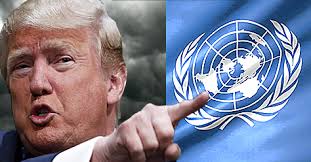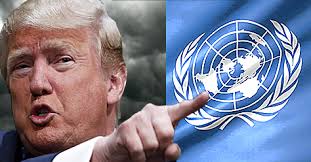The full extent of the damage to international peace and security caused by the US-led Syrian strikes will take some time to become clear. But its impact on the very concept of legality in international affairs is already evident.
Simply put, the most powerful county in the world and its chief satellites, the UK and France, have thrown the rule of law into the trash can. The only “law” now is the law of the jungle. There is no going back.
Ironically, the attack itself was claimed by its perpetrators as enforcement of legality, not of its obliteration. For example, NATO Secretary-General Jens Stoltenberg called the alleged use of chemical weapons by Syrian forces “a clear breach of international norms and agreements” that “calls for a collective and effective response by the international community.”
Leaving aside for a moment the question of what really happened in the Syrian city of Douma, Stoltenberg knows very well what the mechanism is for a collective response by the international community. It is agreement by the United Nations Security Council (UNSC) to “determine the existence of any threat to the peace, breach of the peace, or act of aggression,” and to take military or non-military joint action to “restore international peace and security” under Chapter VII of the United Nations Charter. Such action is subject to veto by the permanent members: the United States, Russia, China, the United Kingdom, and France.
This means that if it were determined to the satisfaction of all five permanent members, and presumably to a majority of all the countries represented on the UNSC at a given time, that aggression or another threat to peace had taken place, joint action, including military action, could be authorized. Under the United Nations system, which is the current governing law of the international order, authorization by the UNSC is the only justification for armed action by a state or group of states against another, other than a country’s “inherent right of individual or collective self-defense if an armed attack occurs” under Article 51 of the charter. Stoltenberg knows this too, since NATO, the organization he heads, is ostensibly based on its members’ “exercise of the right of individual or collective self-defense recognized by Article 51” under the North Atlantic Treaty’s oft-cited Article 5. That’s why operations by Russia and Iran at the invitation of the Syrian government are legal, but those of the US, Turkey, and any other countries not given permission by Damascus are illegal.
In short, in the absence of consensus in the UNSC, no country had or has the legal authority to attack Syria. This is even assuming the claims of chemical-weapons use were true. The Chemical Weapons Convention, to which Syria acceded in 2013, is not self-activating. Nothing gives any other country the legal right to unleash a military action against another country under its own claim that the convention has been violated.
Military action against another state that is neither in self-defense nor authorized by the Security Council has a name. It is called aggression. Based on the bitter experience of World War II, which gave rise to the United Nations in the first place, the UN Charter cites “suppression of acts of aggression” among its fundamental purposes in its Article 1, as judged by the Nuremberg war crimes court:
To initiate a war of aggression… is not only an international crime; it is the supreme international crime differing only from other war crimes in that it contains within itself the accumulated evil of the whole.
For the informed observer, it is shocking how seldom the question of international legality comes up in Western political and media discussion on Syria. One would never know that the UN Charter is a binding treaty. Thus, under American law, it is the law of the land on a par with federal statutes. Its requirements are not optional.
But in the US, no one cares. We are a law unto ourselves. Even the application of US domestic law is hardly mentioned, except to note in passing that the constitutional requirement for congressional authorization is a dead letter and presidents do as they please.
It cannot be stressed enough: the prohibition on any country’s committing aggression against another would apply even if the targeted county were engaged in appalling crimes. Such crimes would include Saudi Arabia’s horrific war against civilians in Yemen, abetted by the very governments self-righteously preening themselves over their moral credentials with respect to Syria.
Still, anyone with a set of eyes and ears and an ability to think on his own can have little doubt that the Syrians did not use chemical weapons at Douma. This is evident in the haste of the countries attacking Syria, just as a team from the Organization for the Prohibition of Chemical Weapons (OPCW) had arrived in Syria and would soon be in a position to shed important light on what actually had occurred. What did Washington, London, and Paris fear would come to light?
In the coming days, we will see what the OPCW and other independent investigators will turn up in Douma, as well as at other targets struck as supposed chemical weapons sites. Hopefully those investigations will be free of the politicized skew of the “Joint Investigative Mechanism” (JIM), which Russia has slammed for its reliance on “cherry-picked facts and accounts by partisan sources.”
Western governments’ arrogation of the right to attack other countries in the absence of legal authority based solely on their own subjective assertion of fact serves as an incentive to fabricate the necessary circumstances to “justify” their actions. It is also an open invitation for false claims by interested governments and for false-flag attacks by combatants. We can be sure that Douma will not be the last allegation of chemical weapons use as outside powers continue their efforts to prolong the Syrian war and thwart the legitimate government’s recovery of its territory from foreign-backed jihadists – whose own possession and use of chemical weapons is established.
Unfortunately, those allegations will not be made within an orderly legal framework that is able to investigate them objectively and decide authoritatively on an appropriate response. That framework, already coming apart under the illegal assaults of Western governments in Yugoslavia, Iraq, Libya, and elsewhere, has been totally shattered in Syria. There is little prospect that it can be reconstructed.
Reprinted with permission from RT.


